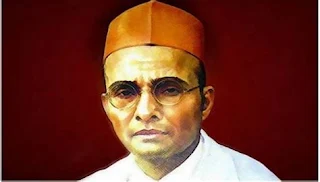Vinayak Damodar Savarkar - should we call him Veer?
Vinayak Damodar Savarkar earned the moniker "Veer" due to his aggressive efforts against British rule, but he was an enigma as well. He lived an eccentric lifestyle while also leading violent revolt against them. But this made for an intriguing life story!
He criticized the Quit India Movement and encouraged Hindus to enlist in the military. Additionally, he condemned superstition, caste system discrimination and worship of cows as unfounded practices.
Who is Savarkar?
Savarkar remains one of the most contentious figures in Indian history. He has been widely described as being either brave, anti-Mahatma Gandhi, and/or even assassins; yet in reality his role was much more nuanced; leading the Hindu Mahasabha which sought to liberate India via violent means from British rule was just one aspect of his journey towards political power.
He was an accomplished author and passionate critic of Indian religious practices he saw as irrational. While in prison, he wrote ideological treatises promoting an expansive vision of Hindu cultural and political nationalism.
Savarkar filed multiple mercy petitions in Andaman & Nicobar Jail for release, after being accused of involvement in Mahatma Gandhi's assassination - claims later rejected by historians. Savarkar has been widely recognized for his dedication to independence but some criticize him for being too soft on British colonizers.
Want to know more about Savarkar? Buy this book-Savarkar: Echoes from a Forgotten Past, 1883–1924
His Personal Life
Savarkar was raised by parents from Chitpavan Brahmin families, and was fiercely patriotic from an early age. He composed ballads (pawadas) while fighting untouchability in India.
Bal Gangadhar Tilak encouraged him to study law in England. With assistance from Shyamji Krishna Verma he traveled to London and enrolled at Gray's Inn Law College before living at India House (an off-campus student residence in North London) while there. While living there he inspired fellow students to form the Free India Society which campaigned against Britishers for freedom.
Savarkar was also one of the founding fathers of Hindu Mahasabha, now part of BJP. While they continue to use him as a political icon today, they ignore his controversial past; Savarkar praised Nathuram Godse for killing Gandhi by glorifying him as a martyr and hailing him as such in speeches at rallies endorsed by both Congress and Savarkar (despite his extremist Hindutva ideologies), though Gandhi disliked his leadership; often criticizing Mahasabha for its anti-Muslim bias.
His Politics
Although his supporters venerate him as a brilliant visionary and staunch patriot, his opponents view him as a reactionary with an authoritarian communalism verging on fascism. He promoted Hindu political and social unity while advocating two nation theory and militarizing Hindus to defend their country.
Savarkar founded his revolutionary group while still in high school. Drawing inspiration from radical Indian patriots such as Lala Lajpat Rai and Bal Gangadhar Tilak, he debated European political texts on revolution and advocated self-reliance (swadeshi). Later enrolled himself at Fergusson College in Pune to complete his B.A degree.
Savarkar was an influential orator and prolific writer who advocated a Hindu nationalist movement. He supported Hindutva against Gandhi's assassination, denouncing caste system through writing an essay entitled Seven Shackles of Hindu Society which condemned caste system. In 1925 he caused Hindu-Muslim riots after publishing Rangeela Rasool, an offensive booklet about Prophet Mohammad - government officials warned him if such another publication appeared again they will reconsider his release from Cellular Jail.
His Controversy
Savarkar was one of the founders and key architects of the Hindu Mahasabha and played an essential role in its organisational growth. Although often celebrated as a "Veer", current-day Congress representatives point out that after being granted clemency in 1924 and released from Cellular Jail in Andamans, he agreed to remain within Ratnagiri district and refrain from revolutionary activities.
He was an outspoken opponent of certain Hindu religious practices he saw as ineffective or impeding their progress, such as caste discrimination. Additionally, he advocated the two-nation theory by supporting an autonomous Hindu nation which would include Muslims as subordinate communities.
He filed at least four mercy petitions with the British for his release from jail, encouraged Hindu militant nationalism, and proposed creating a Hindu Rashtra in India. Unfortunately, his ideas are unpopular with current Left-Liberal echo-chambers who try to discredit his name by emphasizing controversial aspects of his political life.















No comments:
Post a Comment